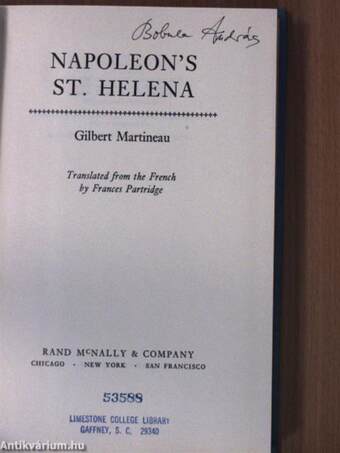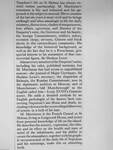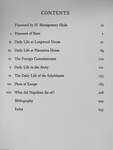1.068.962
kiadvánnyal nyújtjuk Magyarország legnagyobb antikvár könyv-kínálatát

VISSZA
A TETEJÉRE
JAVASLATOKÉszre-
vételek
Napoleon's St. Helena
| Kiadó: | Rand McNally & Company |
|---|---|
| Kiadás helye: | Chicago |
| Kiadás éve: | |
| Kötés típusa: | Fűzött keménykötés |
| Oldalszám: | 241 oldal |
| Sorozatcím: | |
| Kötetszám: | |
| Nyelv: | Angol |
| Méret: | 22 cm x 15 cm |
| ISBN: | |
| Megjegyzés: | Néhány fekete-fehér reprodukcióval. |
naponta értesítjük a beérkező friss
kiadványokról
naponta értesítjük a beérkező friss
kiadványokról
Fülszöveg
Napoleon's life on St Helena has always ex-
cited violent partisanship. M. Martineau's
treatment is fair and balanced and his ap-
proach to his subject is unusual. His re-creation
of the last six years is most vivid and he brings
strikingly and often amusingly to life the daily
existence, distractions, clashes of temperament,
love affairs, agitations, and illnesses of the
Emperor's suite, the Governor and his family,
the foreign Commissioners, soldiers, sailors,
eccentric clergy, servants, Chinese and black
slaves, in this extraordinary community. His
knowledge of the historical background, as
well as the fact that he is a Frenchman, give
special interest to his assessment of that con-
troversial figure, Sir Hudson Lowe.
Almost every member of the Emperor's suite,
including his valet, published memoirs, but
M. Martineau has had access to unpublished
sources—the journal of Major Correquer, Sir
Hudson Lowe's secretary; the dispatches of
Balmain, the Russian... Tovább
Fülszöveg
Napoleon's life on St Helena has always ex-
cited violent partisanship. M. Martineau's
treatment is fair and balanced and his ap-
proach to his subject is unusual. His re-creation
of the last six years is most vivid and he brings
strikingly and often amusingly to life the daily
existence, distractions, clashes of temperament,
love affairs, agitations, and illnesses of the
Emperor's suite, the Governor and his family,
the foreign Commissioners, soldiers, sailors,
eccentric clergy, servants, Chinese and black
slaves, in this extraordinary community. His
knowledge of the historical background, as
well as the fact that he is a Frenchman, give
special interest to his assessment of that con-
troversial figure, Sir Hudson Lowe.
Almost every member of the Emperor's suite,
including his valet, published memoirs, but
M. Martineau has had access to unpublished
sources—the journal of Major Correquer, Sir
Hudson Lowe's secretary; the dispatches of
Balmain, the Russian Commissioner, now in
the diplomatic archives in Moscow, and of
Montchenuer—'old Munchenough' as the
English called him—Louis XVIII's Commis-
sioner. He adds a detailed analysis by an
English pathologist of the known facts con-
cerning Napoleon's last illness and death, in-
cluding reference to the recent alleged discovery
of arsenic in a lock of his hair.
M. Martineau is the French Consul at St
Helena, living at Longwood House, and writes
from personal knowledge of life on the island.
He describes the scenery, vegetation, the clim-
ate and its effect on the health and state of
mind of the inhabitants, and his ability to
create the atmosphere, together with his graph-
ic reconstruction of the daily life of Napoleon
and his entourage, make this an absorbing
book. Vissza
Témakörök
- Idegennyelv > Idegennyelvű könyvek > Angol > Szépirodalom > Megtörtént bűnügyek, dokumentumregények
- Idegennyelv > Idegennyelvű könyvek > Angol > Helytörténet
- Idegennyelv > Idegennyelvű könyvek > Angol > Történelem > Európa története > Egyéb
- Helytörténet > Külföldi > Egyéb
- Helytörténet > Helyismeret > Jeles személyek
- Történelem > Idegennyelvű > Angol
- Történelem > Kontinensek szerint > Európa, európai országok története > Nyugat-Európa > Franciaország
- Történelem > Újkor > Forradalmak kora > Egyéb
- Szépirodalom > Megtörtént bűnügyek, dokumentumregények
Gilbert Martineau
Gilbert Martineau műveinek az Antikvarium.hu-n kapható vagy előjegyezhető listáját itt tekintheti meg: Gilbert Martineau könyvek, művekMegvásárolható példányok
Nincs megvásárolható példány
A könyv összes megrendelhető példánya elfogyott. Ha kívánja, előjegyezheti a könyvet, és amint a könyv egy újabb példánya elérhető lesz, értesítjük.







